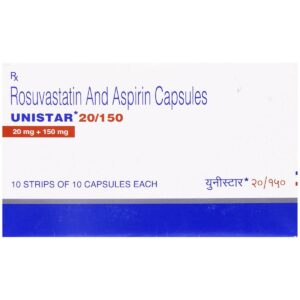ASPIRIN + ROSUVASTATIN
Aspirin: Aspirin, also known by its generic name acetylsalicylic acid, is a widely used medication with analgesic (pain-relieving), anti-inflammatory, and antiplatelet properties. It is classified as a nonsteroidal anti-inflammatory drug (NSAID).
Aspirin is primarily used to relieve mild to moderate pain, such as headaches, toothaches, muscle aches, and menstrual cramps. It is also commonly used for reducing inflammation in conditions like arthritis or swelling after an injury. Additionally, aspirin is widely used as a blood-thinning agent to prevent clot formation and reduce the risk of heart attacks and strokes in people with cardiovascular diseases.
The mechanism of action of aspirin involves the inhibition of cyclooxygenase (COX) enzymes, which play a role in the production of prostaglandins, hormone-like substances that contribute to pain, inflammation, and fever. By blocking COX enzymes, aspirin reduces the production of prostaglandins, leading to pain relief and anti-inflammatory effects. At low doses, aspirin irreversibly inhibits COX-1, which helps reduce the aggregation of platelets and prevent blood clot formation.
The dose of aspirin varies depending on the intended use. For pain relief, the typical dose is 325-650 mg every 4-6 hours, not exceeding 4 grams per day. Lower doses between 81-325 mg are commonly used for cardiovascular protection. It is important to follow the recommended dosage and consult a healthcare provider for specific advice.
While generally safe when used as directed, aspirin may have side effects. Common side effects include stomach upset, heartburn, nausea, and ringing in the ears (tinnitus). Aspirin can also increase the risk of bleeding, especially if taken in high doses or for prolonged periods. Rare but serious side effects may include allergic reactions, stomach ulcers, and bleeding in the stomach or intestines. Long-term use of aspirin may also be associated with an increased risk of gastrointestinal bleeding. Certain individuals, such as those with asthma or blood clotting disorders, may be at a higher risk of experiencing adverse effects.
It is crucial to inform your healthcare provider of any existing medical conditions, current medications, or allergies before taking aspirin, as it may interact with other drugs or worsen certain health conditions. Additionally, it is not recommended for use in children or teenagers with viral infections, such as the flu or chickenpox, due to the risk of Reye’s syndrome, a rare but severe condition.
Rosuvastatin: Rosuvastatin is a medication that belongs to the class of drugs known as statins. It is primarily used to lower cholesterol levels and reduce the risk of cardiovascular diseases such as heart attack and stroke. Rosuvastatin is sold under the brand name Crestor.
The mechanism of action of rosuvastatin involves inhibiting an enzyme called HMG-CoA reductase, which plays a crucial role in cholesterol synthesis. By reducing the production of cholesterol in the liver, rosuvastatin increases the liver’s ability to remove LDL cholesterol from the bloodstream. This ultimately leads to a decrease in overall cholesterol levels.
The recommended starting dose of rosuvastatin is usually 5-10 mg per day, although the specific dose may vary depending on the individual’s cholesterol levels and the desired treatment outcome. It is typically taken orally, with or without food, at any time of the day. However, it is important to follow the instructions provided by your healthcare professional.
Like any medication, rosuvastatin can cause side effects. Some of the common side effects include headache, muscle pain, joint pain, nausea, stomach pain, and constipation. These side effects are generally mild and tend to subside over time. However, if they persist or become bothersome, it is advisable to consult a healthcare provider.
In rare cases, rosuvastatin may lead to more serious side effects such as liver problems, kidney problems, or a condition called rhabdomyolysis which involves the breakdown of muscle tissue. Seek immediate medical attention if you experience symptoms such as dark urine, yellowing of the eyes or skin, persistent nausea, or unexplained muscle pain.
It is essential to inform your healthcare provider about any existing medical conditions, current medications, or allergies before starting rosuvastatin. Also, regular monitoring of liver function and cholesterol levels is recommended during treatment with rosuvastatin.
In conclusion, rosuvastatin is a commonly prescribed medication for lowering cholesterol levels and reducing the risk of cardiovascular diseases. It works by inhibiting cholesterol synthesis in the liver and has a well-established safety profile. However, like any medication, it may cause side effects, and it is important to discuss any concerns or questions with a healthcare professional.

